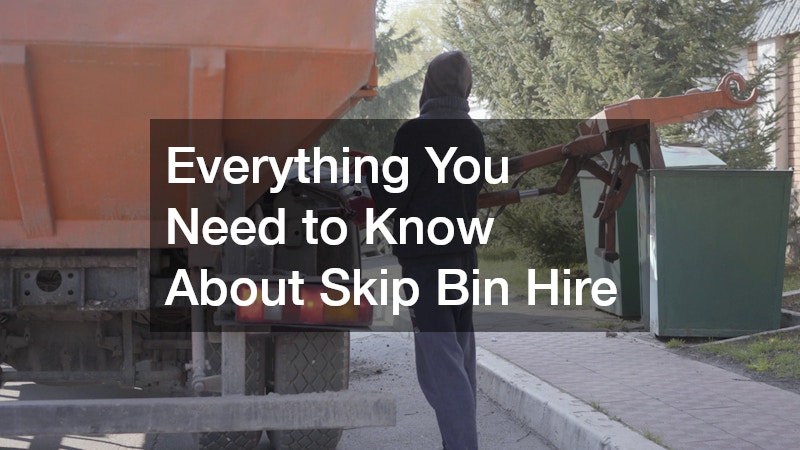Everything You Need to Know About Skip Bin Hire
When it comes to managing waste efficiently—whether from a home renovation, garden project or office clean-up— skip bin hire is one of the most practical solutions available in Australia. It offers a convenient and responsible way to dispose of various types of rubbish, keeping your property clean and reducing environmental impact.
If you’re considering this service, here’s everything you need to know before booking a bin.
What Is Skip Bin Hire?
It involves renting a large, open-topped waste container for a set period. These bins are delivered to your location, placed where convenient (often on a driveway or council-approved spot) and collected once full. They come in a range of sizes to suit different project scopes—from minor spring cleans to full-scale demolitions.
Most Australian skip bin providers offer several categories of bins, such as general waste, green waste, mixed waste and even specialised options for bricks, concrete or soil. This flexibility ensures you only pay for what you need and comply with waste disposal regulations.
Choosing the Right Bin Size
One of the most common mistakes when hiring a skip bin is underestimating how much waste you’ll generate. Skip bins are usually measured in cubic metres, with typical sizes ranging from 2m³ (ideal for small clean-ups) up to 10m³ or larger for commercial jobs.
A 4m³ skip bin, for example, suits mid-sized home renovations, while an 8m³ option is better for major building works. Choosing the correct size can save money and hassle; overfilling a bin may lead to extra charges or the need for an additional hire.
What Can (& Can’t) Go in a Skip Bin
Understanding what materials are allowed in your skip bin is essential. While rules vary slightly between providers, most accept general household items, construction debris, garden waste and old furniture. However, hazardous materials such as asbestos, batteries, paint and tyres are typically prohibited unless the company provides a specific bin for those items.
It’s a good idea to ask your skip bin provider for a list of accepted items before loading your bin. Placing restricted materials in a general waste bin could not only incur penalties but also pose a risk to the environment and those handling the rubbish.
Do You Need a Council Permit?
If you plan to place the skip bin on public property (such as a nature strip or road), many local councils across Australia require you to obtain a permit. This is especially important in suburban or high-traffic areas.
Some skip bin companies will organise this on your behalf, while others may expect you to handle the paperwork. Failing to secure the proper approvals can result in fines or delays, so always check ahead of time.
Environmental Responsibility
Rubbish bin hire plays a crucial role in supporting sustainable waste management in Australia. Reputable providers sort the waste at transfer stations, recycling as much material as possible to divert it from landfill. This includes metals, concrete, timber and green waste.
Choosing an environmentally responsible dumpster company not only ensures compliance with Australian environmental standards but also contributes to broader efforts to reduce the nation’s waste footprint.
Costs & Budgeting
The cost of rubbish bin hire depends on several factors, including bin size, type of waste, hire duration and your location. Prices typically start from around $150 for small bins and can exceed $600 for larger, specialised units.
To avoid surprise fees, ensure you understand what’s included in your quote. Some companies charge extra for items like mattresses or whitegoods and overfilling the bin can result in weight-based surcharges. Comparing a few providers and reading customer reviews can help you find reliable, cost-effective services.
Tips for Efficient Use

To make the most of your waste bin hire:
- Break down bulky items before placing them inside to maximise space.
- Load heavier items first, followed by lighter materials on top.
- Avoid leaving gaps—stack items tightly to reduce wasted space.
- Don’t overfill past the bin’s rim; most companies will refuse to remove an overloaded bin due to safety concerns.
A well-packed skip bin can save you the cost of hiring an additional one and streamline your clean-up process.
Whether you’re undertaking a major renovation or simply clearing out the garage, rubbish bin hire is a smart and sustainable way to manage waste. By understanding the types of bins available, legal considerations and how to use your hire effectively, you can ensure your clean-up runs smoothly from start to finish.
Skip bin hire isn’t just about convenience—it also encourages responsible disposal, supports local recycling efforts and helps keep your property and community tidy. With a bit of planning, it’s a service that delivers long-lasting value for homeowners, businesses and tradespeople alike.




Post Comment